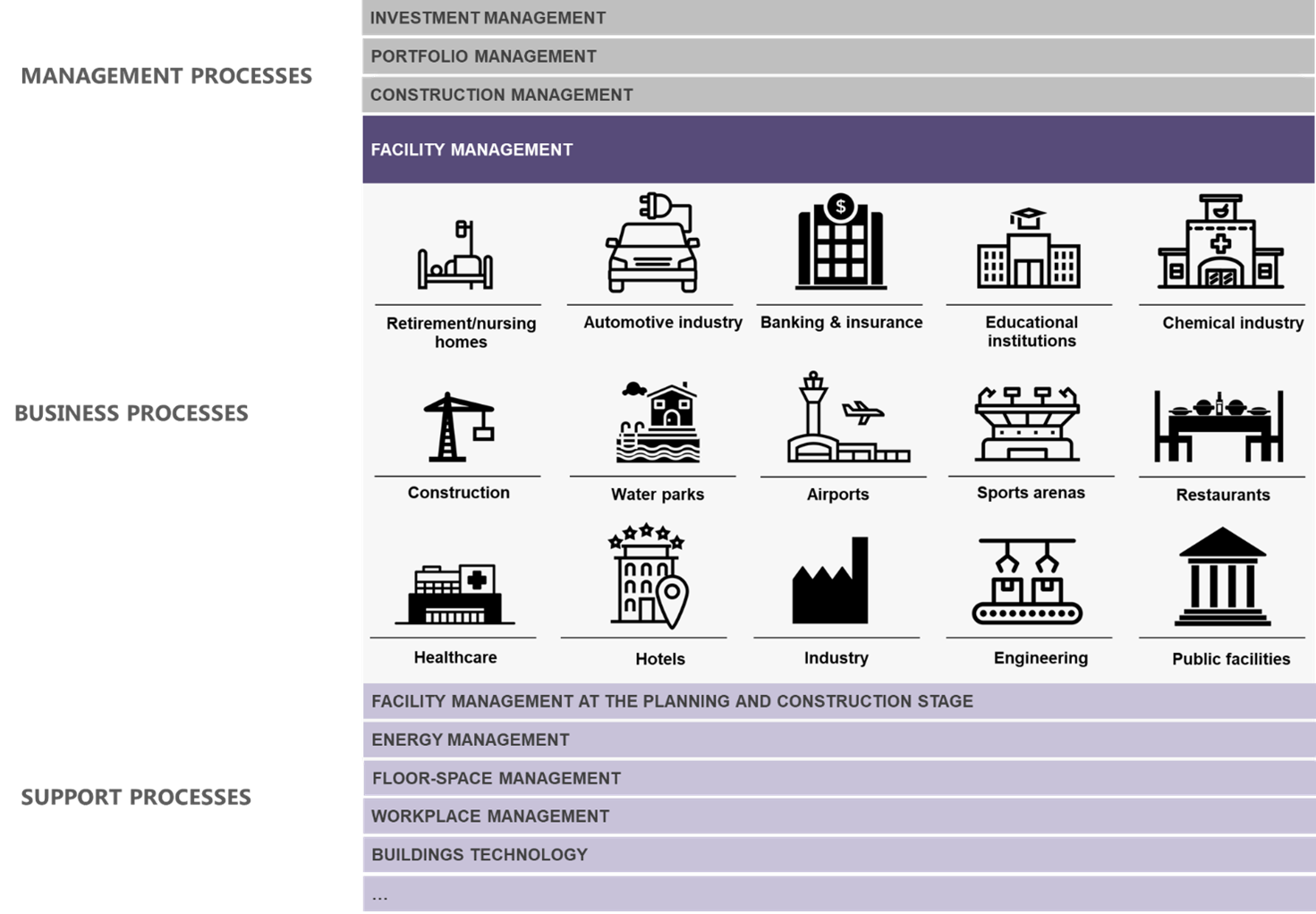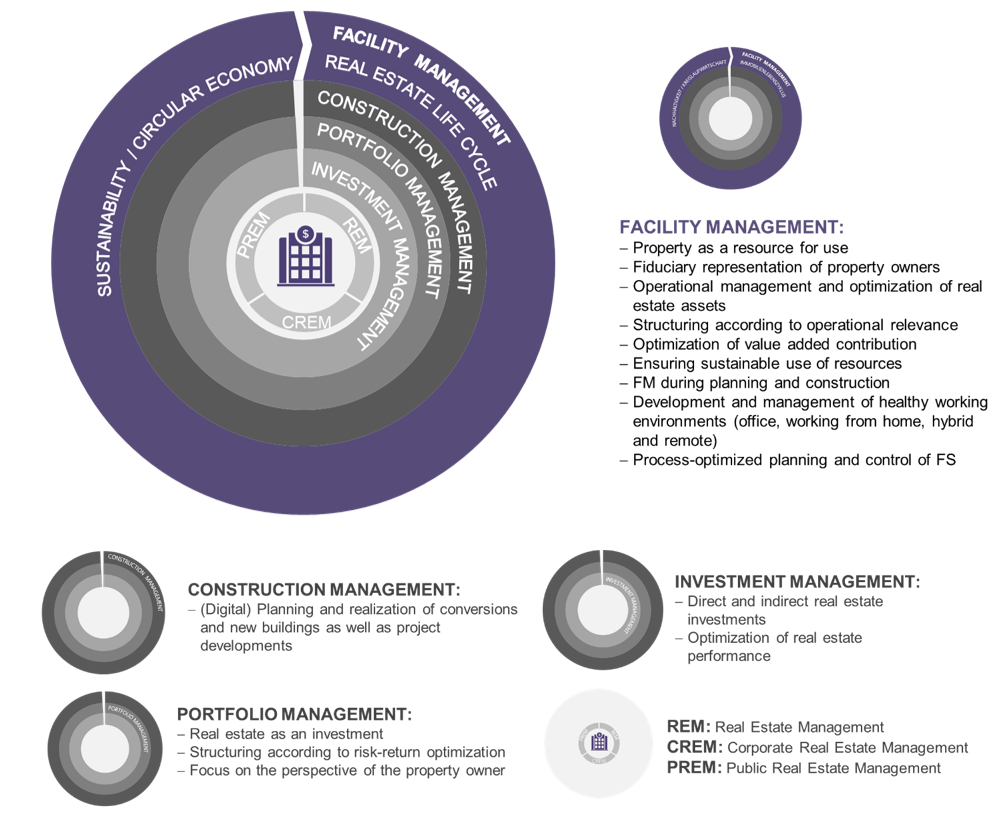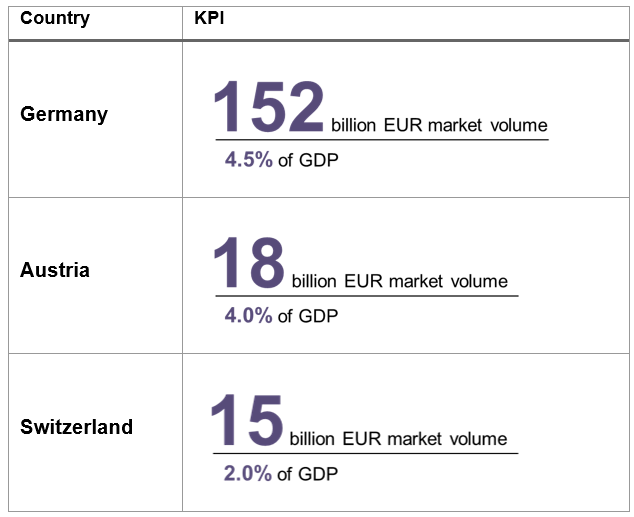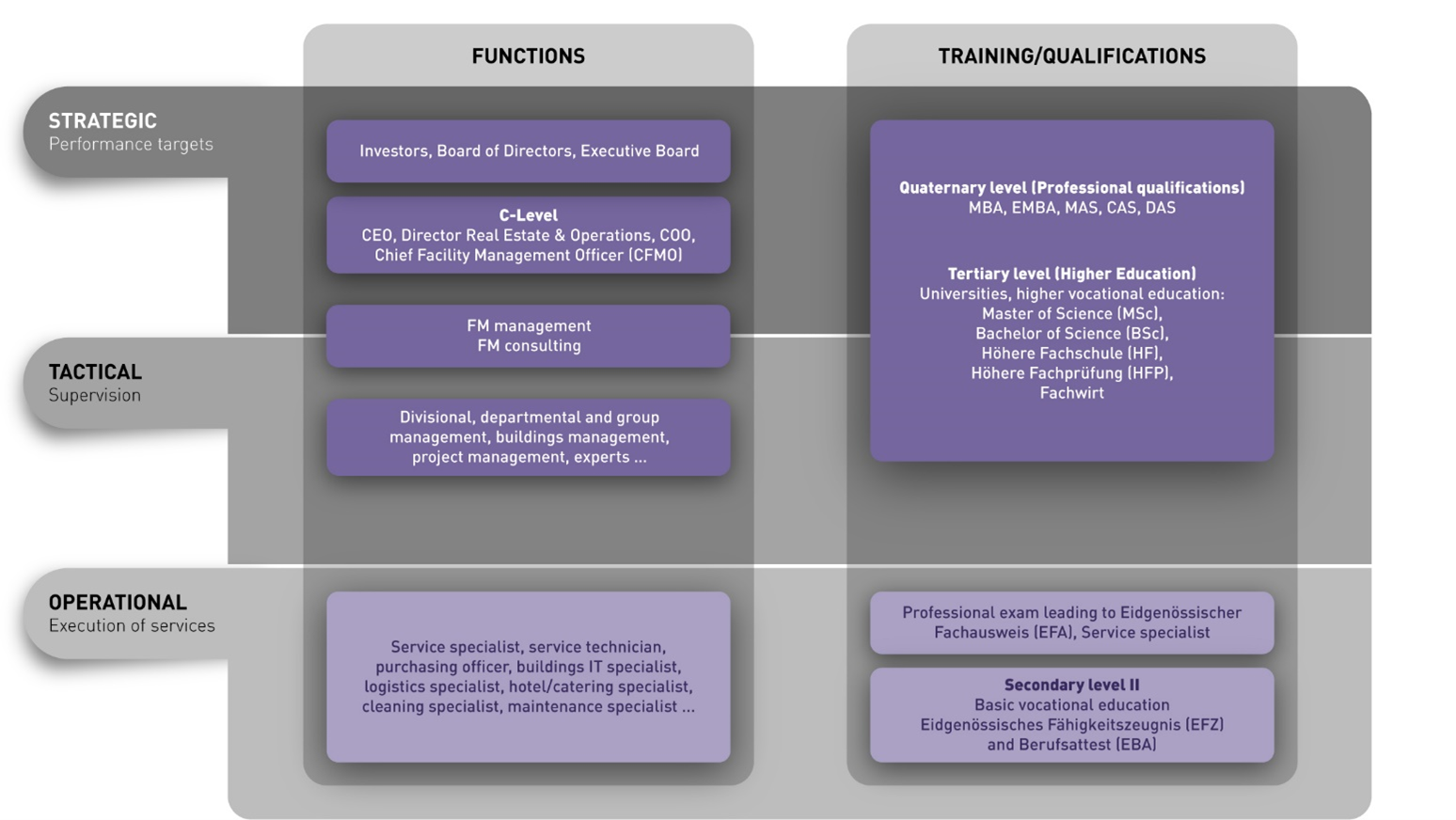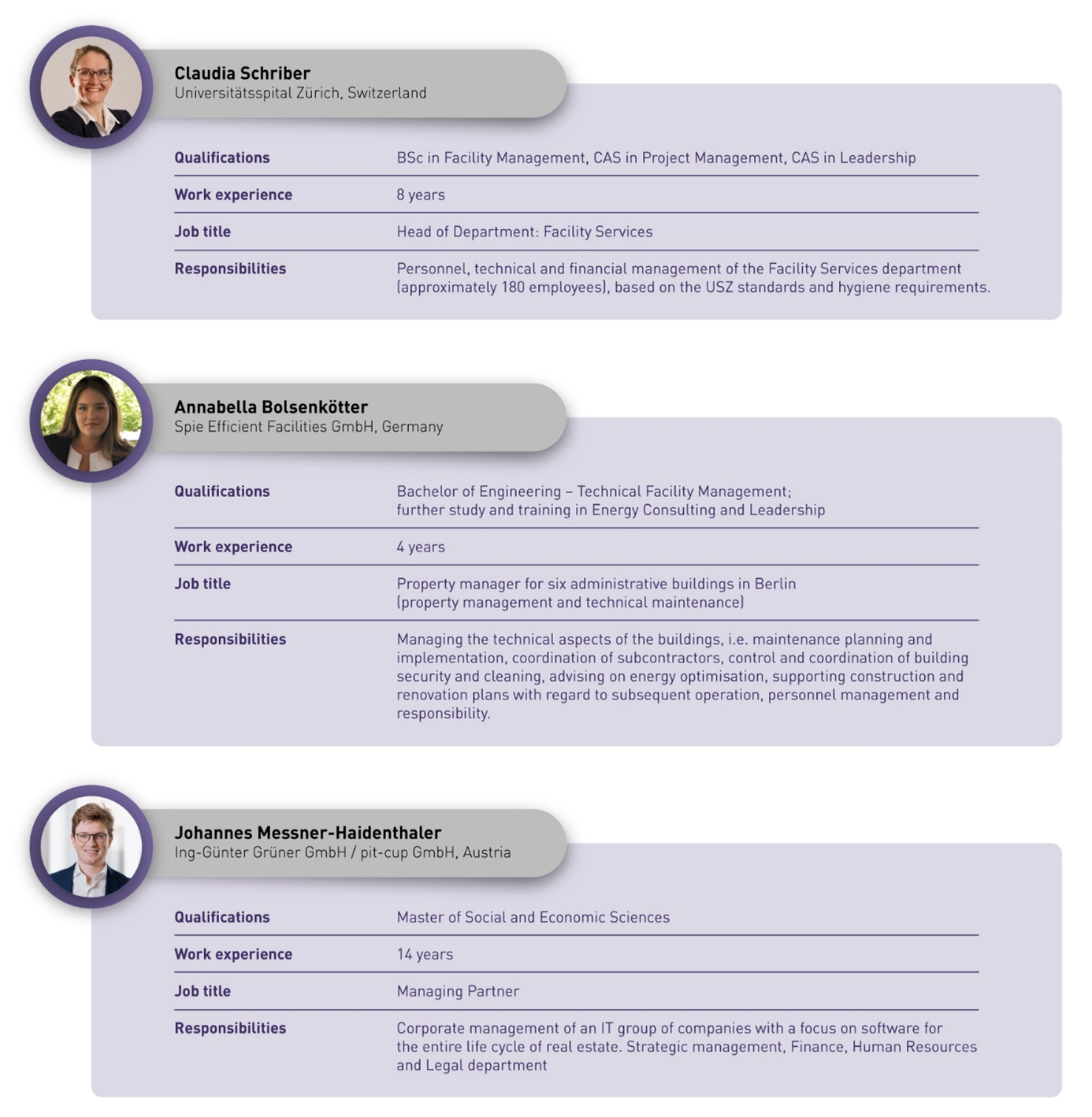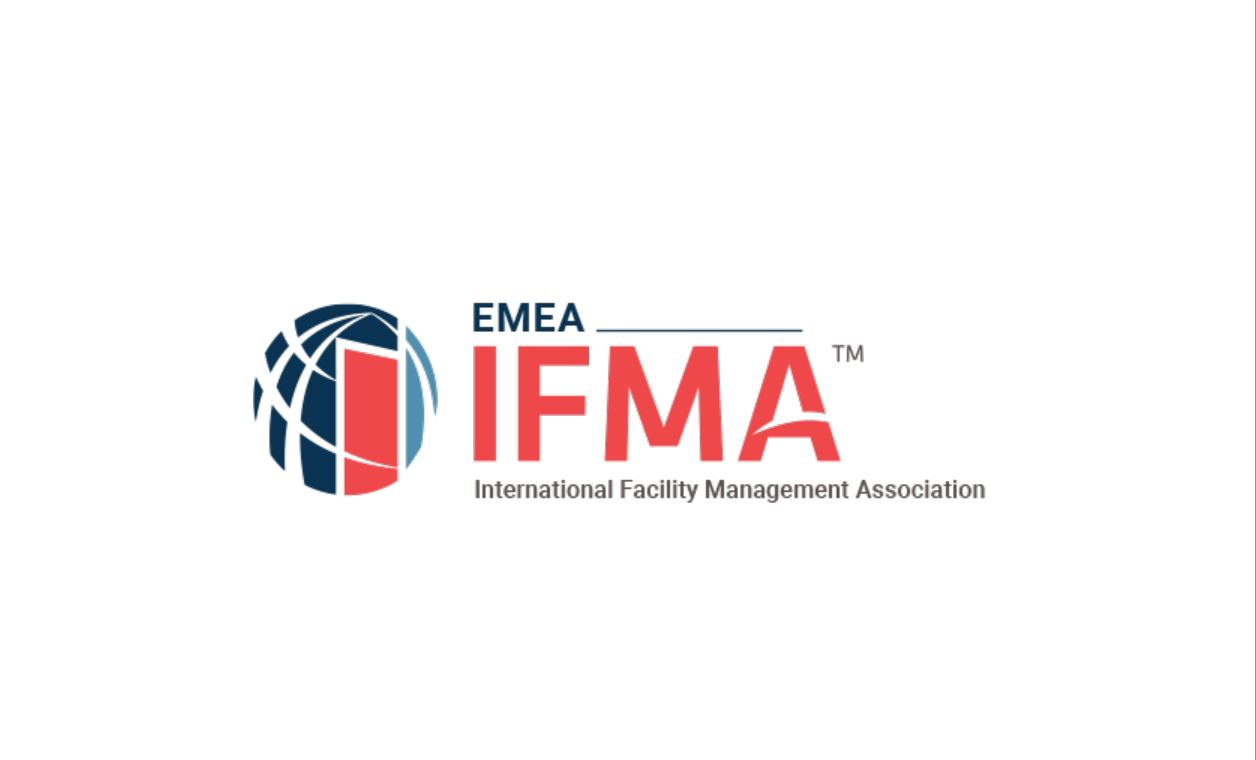Efforts aimed at professionalizing the FM sector are significantly advanced by the ongoing improvement of training offers, the creation of industry standards and products by the professional associations and, in particular, by the further development of international (International Organization for Standardization, ISO), European (European Standards, EN) and national standards:
The ISO standard 41001 (2017) defines FM as follows: “An organizational function which integrates people, place and process within the built environment with the purpose of improving the quality of life of people and the productivity of the core business”.
3.1 Task areas
Despite standardized role and process models, FM and FS services are still provided on a contextual basis, because requirements vary according to country, sector and organization. This publication therefore aims not to describe generally applicable task areas for the entire DACH region, but rather to provide a general outline of the diverse task areas and process models by means of individual examples, all of which must be specifically adapted for the individual companies.
Generically simplified FM process map
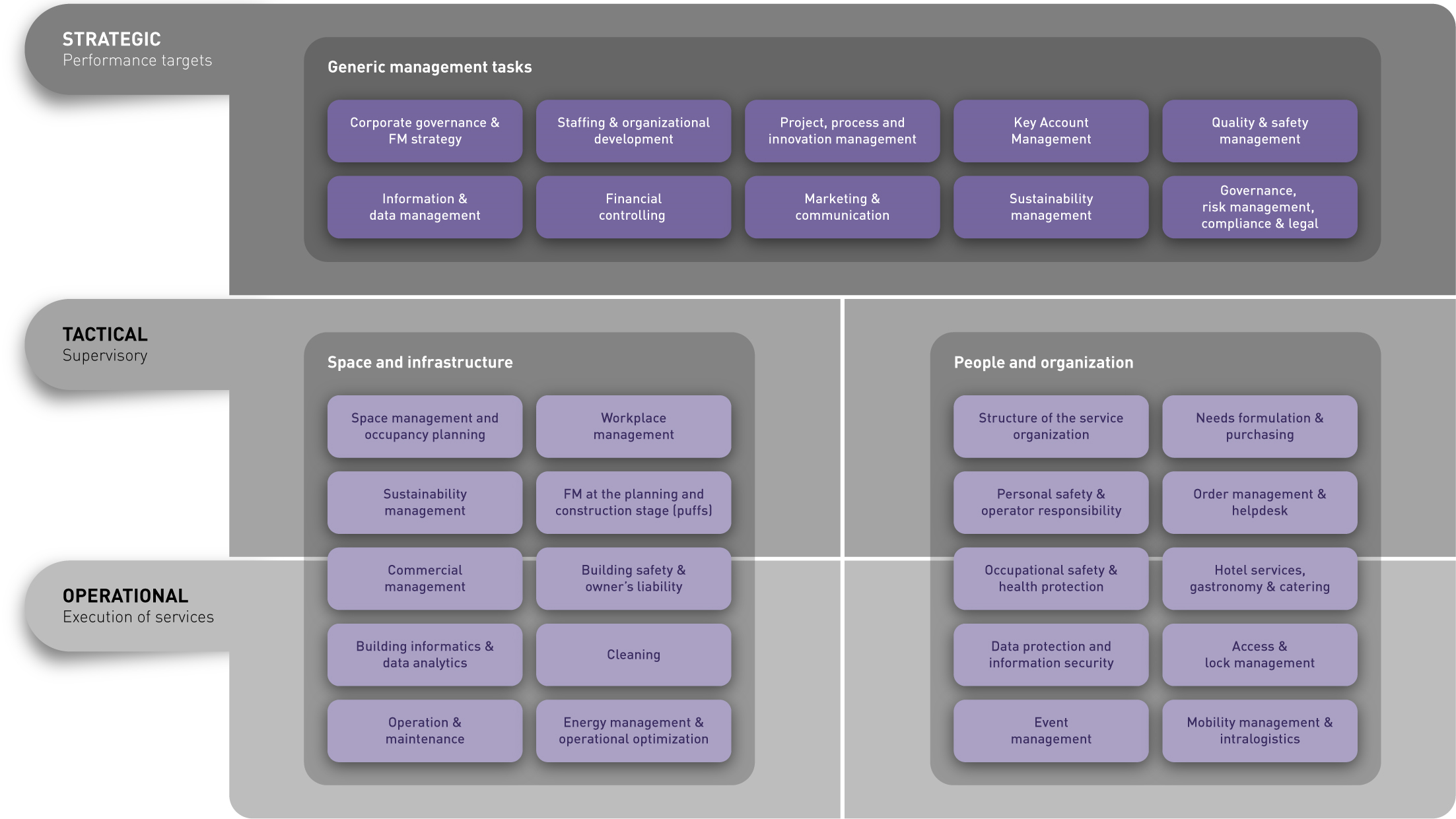 Source: Authors of publication
Source: Authors of publication
3.2 Levels of responsibility
3.2.1 The strategic level
At the strategic level, the unit responsible for FM – usually senior management – assumes company-wide process responsibility for the provision of technical infrastructure systems that meet requirements and for the associated services. This makes a fundamental contribution to the long-term achievement of the goals of the core business in the following ways:
-
by defining the requirements for achieving the long-term goals and content of FM;
-
by providing and securing appropriate infrastructure systems;
-
by developing efficient management strategies;
-
by defining (quality) standards for floor space usage, for provision of equipment, for processes and services;
-
by recruiting and training FM personnel;
-
by ensuring compliance with laws and directives, such as occupational health and safety, liability of property owners and responsibility of operators.
The above-mentioned tasks are associated with exceptionally high demands on HR responsibility and operational planning, on leadership qualities as well as coordination and integration skills.
3.2.2 The tactical level
Below the strategic level, where company-wide responsibility lies, comes the tactical level, where the prime considerations are floor space and infrastructure as well as people and organization. Facility management professionals do not perform operational tasks (e.g. maintenance and cleaning) themselves, but plan, organize, manage and direct them. Central tasks here are:
-
operational measures for the achievement of strategic objectives;
-
the management of day-to-day service tasks and quality assurance;
-
the management of FM projects and FM processes,
-
the execution and implementation of agreements through leadership of the company’s own FM team or management of external service providers.
3.2.3 The operational level
The operational level is covered by employees who provide a wide range of facility services based on the contractually agreed framework conditions. These include:
- workplace management,
- energy and media supply,
- operation/maintenance,
- intralogistics,
- cleaning,
- building and grounds maintenance (including winter maintenance),
- catering arrangements for employees,
- security/safety services.
3.2. Competences
The diversity of tasks in FM goes hand in hand with a wide variety of professional, social, methodological and personal competences. We elaborate on some of the professional/social competences below. Methodological and personal competences flow into the new FM Competence Wheel, which includes many elements of digital transformation competence. Specialized professional staff (vertical competence building) and diversified professional staff (horizontal competence building) in FM and FS are in demand in a wide range of industries and companies. However, their areas of responsibility have changed considerably in recent years in the course of the digital transformation, whereby the mental attitude towards problem-solving strategies and openness to new things (mindset) play a key role. People who work in FM and possess some or all of the hard/soft skills generically shown in the FM Competence Wheel are best equipped to meet current and future challenges:
FM Competence Wheel
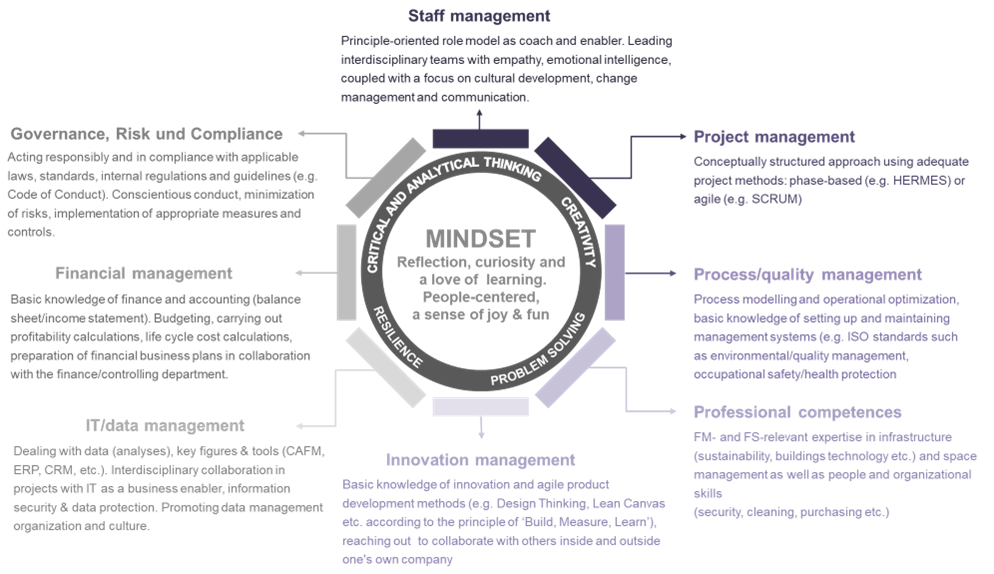 Source: Authors of publication
Source: Authors of publication
3.3.1 Professional competences
As a generalist management discipline, FM also encompasses a wide variety of competence requirements due to the diversified fields of activity. A comprehensive overview is provided by gefma 610. The technical competences and organizational/HR competences form the basis for creative, autonomously organized solutions to challenges of the most diverse kind. Essential qualities here are:
-
strategic skills such as interdisciplinary thinking, user orientation and value enhancement for the company with regard to the development and implementation of corporate strategies in FM,
-
specialized knowledge in the areas of planning and operation as well as the renovation and conversion of buildings and other facilities. The competences in particular demand here are in the areas of construction and building technology, security/safety technology, building automation, standards, responsibility of operators, management of floor space, energy management, operational hygiene and organization of facility services, as well as in cross divisional IT.
The increasingly stringent quality requirements make it necessary for Facility Managers to have a deeper knowledge of their clients’ business processes. The consequence is that, in certain industries, specialized FM/FS services are in demand. In this respect, it is necessary to focus on the requirements not only of individual economic sectors (healthcare, pharmaceutical industry, automotive industry, insurance companies, banks etc.), but also of the public sector and of research institutions.
3.3.2 Digital transformation competence
Professional skills in the use of technologies such as Internet of Things (IoT), Big Data, Artificial Intelligence (AI), Building Information Modelling (BIM) and cybersecurity as well as in the aforementioned implementation of the Digital Transformation in FM and real estate are key competences for future Facility Managers. Technological advances combined with cultural changes have greatly changed the way work, learning and Human Resources are managed.
3.3.3 Workplace Management
Having the right configuration and supply of work infrastructure is of great importance. The traditional office is becoming more flexible and is mainly used for communication and upholding corporate identity. Consequently, fixed workplaces are being replaced by environments for activity-based working. Four modern forms of work have emerged:
-
the traditional office (office space provided by companies);
-
the hybrid office (technical equipment for both face-to-face and digital meeting participation);
-
working from home;
-
remote working (while travelling between locations, in so-called ‘third places’ such as co working spaces or in public infrastructures).
With hybrid office forms, the infrastructure (classic office and remote workplace) as well as the building technology and all individual facility services (FS) are amalgamated into a highly motivational working environment. In this way, FM makes a significant contribution to a high level of employer attractiveness. At the same time, the concomitant merging of work and private life presents a challenge. Resilience has become an even more important factor, as the absenteeism rate due to illness has increased in many companies. Video conferencing has its advantages and complements physical contact, although it can never replace it. The work that needs to be done on company premises (e.g. to improve social exchange and communication, to hold strategy meetings or innovation workshops) has to be defined on a team-specific basis. The infrastructure in terms of layout planning, room dimensions, choice of furniture, color scheme and materials/fabrics as well as offsetting arrangements requires optimal design and implementation. However, not only modern office environments but also workplaces at home must satisfy ergonomic criteria in order to ensure healthy and efficient working practices. This applies in particular to people with disabilities (diversity and inclusion criteria).
3.3.4 Sustainability competence
The climate crisis, as manifested in the increased occurrence of phenomena such as heat/drought disasters, famines, tornadoes, floods, earthquakes etc., causes great suffering and damage running into billions of euros. The problems caused by greenhouse gases can only be solved by humanity working together on a global scale. All UN member states are under an obligation to implement the 17 ambitious Sustainable Development Goals (SDGs) as a core element of the 2030 Agenda for Sustainable Development. The binding EU directive on Corporate Sustainability Reporting (CSRD) due to come into force in 2024 defines the requirements in the area of Environment, Social & Governance (ESG) which companies must declare annually. Major levers for the reduction of greenhouse gases are the circular economy, energy savings and the switch to renewable forms of energy. FM therefore plays a pivotal role in the consideration of sustainability aspects, as it is here that sustainability in companies and organizations is ensured. These new requirements imposed by the European Union towards achieving climate targets lead to new Key Performance Indicators (KPIs) and benchmarks in the real estate sector. Here are a few examples to illustrate future requirements for FM in the area of energy modernization of a nation’s building stock:
Green Deal, European Climate Law, 2030 EU Climate Target Plan an Fit for 55, Renovation Wave (the renovation of 35 million buildings by 2030 and creation of 160,000 green jobs). Smart readiness indicator (SRI) and Energy Performance Certificates (EPC), Whitepaper Energieeffizienz und Klimaschutz (Whitepaper on Energy Efficiency and Climate Protection published by IFMA Austria) and ESG Sustainability Criteria (EU Taxonomy, EU Taxonomy Compass, Explanation).
3.3.5 Social competences
Despite the high degree of digitalization and use of technical components, FM is primarily a ‘people business’ in which transformation competences and adaptability are called for. Diversity, variety and inclusion are key factors behind the success of teams drawn from different areas of expertise. Strong communication and cooperation skills, customer focus and the ability to work in a team are important prerequisites at the interface with diverse stakeholders. In addition, social skills and mutual esteem are essential elements in dealing with people from different countries, languages, cultures, ages and levels of experience. But assertiveness, willingness to take risks and negotiation skills are also important personal qualities in circumstances where projects have to be implemented with limited resources.
3.4 Roles within an organization
One of the many attractions of working in the FM sector is its versatility. There are no ‘typical’ FM roles as such, as they vary according to the context, e.g. property owner, property user, service provider or adviser, all with different emphases. Regardless of whether FM professionals work in corporate or property organizations, for facility service providers or their subcontractors, their range of responsibilities will include the following elements: provision of resources and return on investment, satisfying needs and requirements and fulfilment of performance. In the three DACH countries, there are three central roles in FM which, in collaborative business relationships, preferably function alongside each other and yet represent different interest groups:
Interaction model
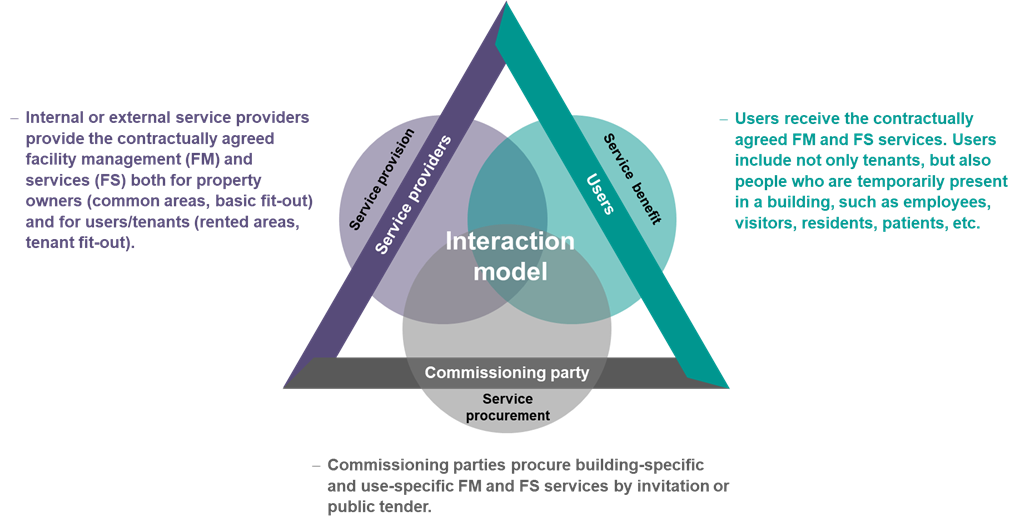 Source: Authors of publication
Source: Authors of publication
The preceding definitions refer to the operational phase of real estate. Additional differentiation applies in construction projects. Here, FM has an important dual role to play: firstly, the Facility Manager in his or her FM capacity at the planning and construction stages ensures that the future requirements and specifications of the users/clients are taken into account (e.g. life cycle and investment considerations, quality assurance), and secondly the Facility Manager as the commissioning party who implements these requirements in collaboration with the specialist planners, as this schematic diagram shows:
Generic organization of building projects
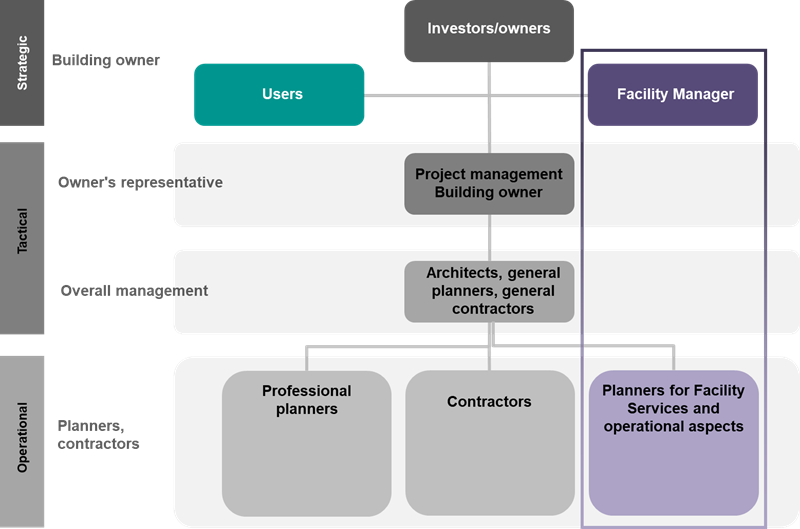 Source: Based on ‘Prozess- und Leistungsmodell’ (ProLeMo) published by crb and IFMA Switzerland in 2021
Source: Based on ‘Prozess- und Leistungsmodell’ (ProLeMo) published by crb and IFMA Switzerland in 2021
In all three DACH countries, a number of new focus topics are emerging for those responsible for operations and construction projects. These are derived from overriding objectives such as climate protection, resource economy, efficient use of space, digitalization etc., where the relevant competences are in great demand.
One tool for describing the roles and services in FM is Funktions- und Leistungsmodell im FM (Function and Service Model in FM) developed in 2020 by RealFM, SVIT FM Switzerland and Facility Management Austria (FMA). This is explained by means of application guidelines in a separate document. Depending on the size of the company and its core business, FM combines countless roles horizontally as well as vertically at the strategic, tactical and operational levels. This is because the FM professional has a varied set of technical, organizational and financial qualifications in his or her CV. As digitalization continues its steady advance, additional roles and tasks are constantly emerging. This makes FM even more attractive as a profession. Because of the diversity of roles and requirements, there is overlap with other professional fields in real estate and infrastructure management. Cross-entry from related professions such as civil engineering and architecture, industrial engineering, business administration, technology, IT and many others therefore becomes easier.

